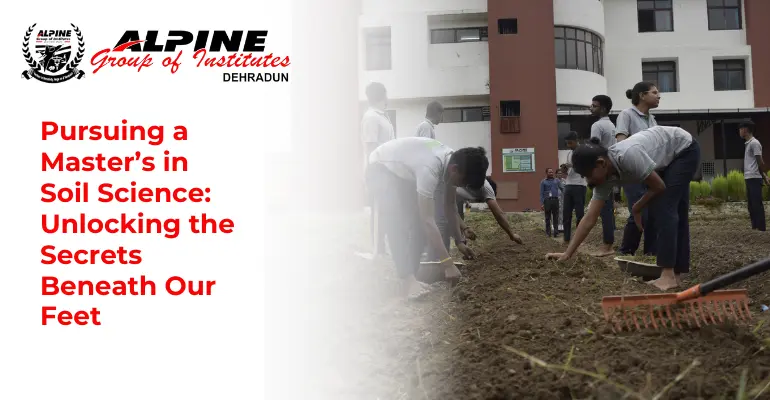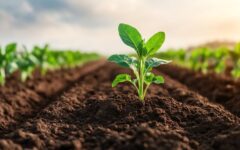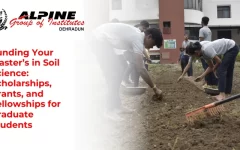Pursuing a Master’s in Soil Science: Unlocking the Secrets Beneath Our Feet
2024-12-16 9:50Pursuing a Master’s in Soil Science: Unlocking the Secrets Beneath Our Feet
Soil is often referred to as the “skin of the Earth,” but its importance goes far beyond its surface appearance. From supporting plant growth to playing a key role in water filtration, carbon storage, and the cycling of essential nutrients, soil is the foundation of life on Earth. Yet, despite its significance, soil science is a field that many people don’t fully understand at least, not until they delve into its study.
If you’re passionate about the environment, agriculture, or sustainability, a Master’s in Soil Science can be the perfect pathway to a rewarding and impactful career.
Why Pursue a Master’s in Soil Science?
1. Addressing Global Challenges
Soil science is at the forefront of tackling some of the most pressing challenges facing humanity today. These include food security, climate change, water scarcity, and soil degradation. With a master’s degree in soil science, you’ll be equipped with the knowledge and tools to help solve these global problems. Whether you’re improving soil fertility to increase agricultural productivity or developing techniques to combat desertification, your work will have a direct impact on the well-being of our planet.
2. Interdisciplinary Field with Real-World Impact
Soil science is a highly interdisciplinary field that combines aspects of biology, chemistry, geology, physics, and environmental science. This makes it a unique and dynamic area of study that provides insights into natural processes and human interventions. You’ll gain hands-on experience in both the laboratory and fieldwork, applying scientific principles to real-world problems like soil erosion, pollution, and land management.
3. Career Opportunities in Diverse Fields
A Master’s in Soil Science opens the door to a wide range of career paths. Graduates can find opportunities in academia, government agencies, environmental consulting firms, agricultural businesses, and nonprofit organizations. Some specific roles include:
Soil Scientist:
Conducting research and analysis on soil properties, quality, and health.
Agronomist:
Advising farmers on soil management practices to optimize crop yields.
Environmental Consultant:
Providing expertise in land reclamation, contamination cleanup, and sustainable land use.
Agricultural Extension Specialist:
Educating farmers, communities, and businesses about soil health and sustainable practices.
Researcher/Academic:
Leading research initiatives on soil-related issues or teaching the next generation of soil scientists.
You could work in sectors such as agriculture, environmental conservation, land development, or climate science, with the ability to impact soil management policies and practices on a global scale.
4. Growing Demand for Soil Scientists
As environmental concerns grow and the need for sustainable agricultural practices becomes increasingly urgent, the demand for trained soil scientists is on the rise. Soil health is central to addressing issues like food security, water conservation, and climate change mitigation. Organizations across the world need experts who can assess soil quality, manage land resources, and create policies for sustainable land use. A master’s degree positions you to meet these needs.
What to Expect in a Master’s in Soil Science Program
1. Core Curriculum
A typical Master’s in Soil Science will include a mix of foundational and advanced courses that provide both theoretical knowledge and practical skills. Common subjects you might encounter include:
Soil Ecology and Microbiology:
Understanding the role of microorganisms in soil processes like nutrient cycling and disease suppression.
Soil Fertility and Nutrient Management:
Examining soil properties that influence plant growth and how to manage soil for optimal agricultural productivity.
Soil and Water Conservation:
Focusing on techniques to prevent soil erosion, conserve water, and ensure sustainable land use.
Soil Chemistry:
Studying the chemical composition of soil and how it interacts with plants, water, and pollutants.
Soil Physics:
Investigating the physical properties of soil, including texture, structure, and permeability, and their impact on plant health.
Environmental Impact and Soil Remediation:
Understanding how soil degradation and contamination occur and how to mitigate them through soil restoration and remediation practices.
Many programs also offer specialized tracks or electives that allow you to focus on specific topics like agroecology, soil conservation policy, or environmental toxicology.
2. Fieldwork and Lab Research
A key component of a Master’s in Soil Science is the practical application of what you learn in the classroom. This may include field research on soil quality, soil mapping, or ecological restoration, as well as laboratory experiments testing soil samples for various physical, chemical, and biological properties. You may also have the opportunity to intern with research organizations, agricultural companies, or environmental agencies to gain real-world experience.
3. Thesis or Capstone Project
In many soil science master’s programs, you will be required to complete a thesis or a capstone project. This independent research project will allow you to explore a specific soil science topic in-depth, contributing new knowledge or solutions to the field. Working closely with faculty and industry experts, you will conduct your research and present your findings, honing both your technical and communication skills.
Career Outcomes for Soil Science Graduates
A Master’s in Soil Science provides a diverse set of skills that can be applied to various sectors. Some potential career outcomes include:
Environmental Consultant:
Conduct soil testing, land assessments, and provide recommendations for land reclamation or sustainable use practices.
Agricultural Advisor:
Work with farmers to develop soil management strategies that optimize crop production while conserving natural resources.
Research Scientist:
Conduct groundbreaking research on soil health, carbon sequestration, or pollution remediation.
Sustainability Manager:
Help companies or organizations implement soil and land management practices that align with sustainability goals.
Policy Analyst:
Use your expertise to shape government policies related to land use, agriculture, and environmental protection.
Conclusion
Soil science is a field that bridges the gap between science and real-world solutions. With a Master’s in Soil Science, you’ll gain the knowledge and experience to address some of the world’s most pressing environmental challenges. Whether you’re passionate about sustainable agriculture, environmental conservation, or climate change, a master’s in soil science offers you the tools to make a lasting impact.
With increasing global recognition of the need for sustainable land management, the demand for qualified soil scientists is higher than ever. By pursuing this advanced degree, you’ll be positioned at the cutting edge of science and policy, working to protect and preserve the very foundation of life on Earth.






